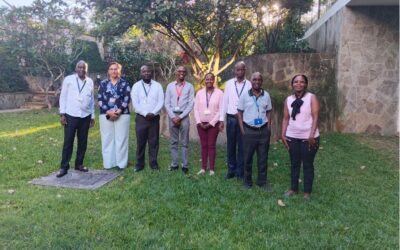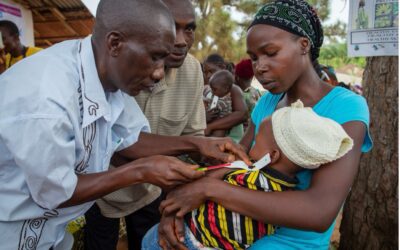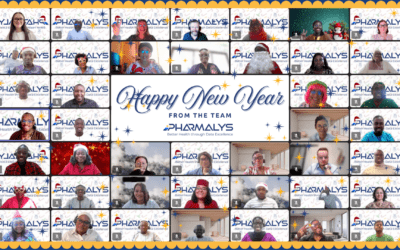Pharmalys is pleased to announce that, effective from 2025, we have taken on the full management of the Good Clinical Laboratory Practice (GCLP) Accreditation Scheme, which we have co-managed with Tim Stiles of Qualogy 2002 Ltd for the past two years. This marks an important milestone for Pharmalys and continues our commitment to enhancing clinical research quality worldwide.
The GCLP Accreditation Scheme has been a vital part of clinical trials since 2003, helping laboratories meet international standards and ensure the integrity of data produced in the research process. As a trusted partner in clinical trial management, Pharmalys has worked closely with clinical trial facilities, providing training and support to laboratory staff during site visits. This hands-on involvement has allowed us to contribute to the growth of the GCLP accreditation community and gain invaluable insights into the complexities of clinical research labs.
The Significance of GCLP Accreditation
The GCLP Accreditation Scheme aims to ensure that laboratories involved in clinical trials meet the highest standards of quality and integrity, which are critical to successful clinical research outcomes. The World Health Organization (WHO) recognised the importance of these standards and adopted GCLP as guidance for their laboratories in 2009, reinforcing its global relevance.
Including laboratories from across the globe – such as hospital, central, private, research, and investigator site labs – the scheme plays a significant role in safeguarding the reliability of clinical trial data. Laboratories participating in the GCLP scheme perform a range of activities, from pharmacokinetics (PK) and routine haematology to non-routine sample analysis, like immunology. By becoming part of the GCLP Accreditation Scheme, laboratories gain recognition, improve operational efficiency, and bolster their credibility, which is essential in the highly regulated and competitive field of clinical research.
Read more here.

Pharmalys and Corporate Social Responsibility
What is Corporate Social Responsibility?
Corporate Social Responsibility (CSR) has deep intellectual roots that date back to the 1950s and 1960s, when economists such as Howard R. Bowen and William C. Frederick completed an in-depth reflection on the social responsibilities of businesses and their executives. Their reflections emerged in response to ethical questions raised by the professionalisation of management and the rise of large corporations. By the 2000s, CSR had become a widely recognised concept and since the early 2010s, the percentage of major companies publishing CSR reports has consistently remained above 90%, illustrating its global adoption.
CSR is typically defined as a business model where companies address social and environmental concerns in their operations and interactions with stakeholders, rather than focusing solely on economic profits.
One of the most prominent CSR standards, the ISO 26000 norm, explicitly connects CSR to Sustainable Development. This aligns with the definition proposed by the World Business Council for Sustainable Development: ‘CSR is the continuing commitment by business to behave ethically and contribute to economic development while improving the quality of life of the workforce and their families as well as of the local community and society at large.’
What does Corporate Social Responsibility Mean for Pharmalys?
In health research
Marieme Ba, founder and CEO of Pharmalys, is an advocate for inclusivity in health research, particularly in Sub-Saharan Africa, where the region continues to lag behind. Recognising the continent’s inadequate research infrastructure, which hinders evidence based policymaking for better health outcomes, Marieme and the Pharmalys team have spent years strengthening the ecosystem. Their efforts aim to position health research as a cornerstone of a robust health sector.
At Pharmalys, we focus on building both research and healthcare capacity, knowing that this approach strengthens health systems, expands programming, and provides essential evidence for managing health crises. For over a decade, we’ve collaborated with health research authorities, Ethics Committees, commercial and academic sponsors, product development partners, research centres, researchers, students and learners, funders, and non-profits. Together, we’ve worked to raise awareness, identify gaps, build skills, strengthen infrastructure, and establish standards for data excellence among those who undertake, regulate, conduct, and manage clinical trials. Read more here.

Social RespFrom my First Steps at Pharmalys to Leadership: Simone’s Inspiring Rise to Project Management Team Lead
My journey with Pharmalys began in 2019 when I collaborated directly with the company from the sponsor side. I was eager to continue contributing my expertise to clinical research (CR), particularly managing and leading clinical trials (CT) in Africa. In April 2021, after my maternity leave, I joined Pharmalys as a part-time CR Professional. It was a time of both excitement and uncertainty as I was navigating the challenges of being a working mother with a baby at home. It felt like the perfect balance between pursuing my passion and managing family responsibilities. Little did I know, it was just the start of an incredible adventure. Pharmalys welcomed me with open arms, and from the beginning, I felt a sense of belonging within the team. Although working just fifteen hours per week came with challenges, I always found the motivation to contribute my skills and knowledge, while also advancing my expertise alongside such dedicated professionals.
Working as a Clinical Research Professional
My role as a CR professional was dynamic and multifaceted. I was fully immersed in the intricacies of the CTs I worked on. As the unblinded project manager for a very important and high-profile malaria vaccine trial alongside other trials, I emphasised the importance of meticulous Investigational Medicinal Product (IMP) management and monitoring. My years of experience came into play as I applied these skills. In addition to managing trials, I line managed clinical research associates (CRAs), coached and mentored junior staff, wrote and reviewed Standard Operating Procedures (SOPs), and contributed to business development. Each day brought new challenges and opportunities to apply and expand my knowledge and skills. Read more here.











